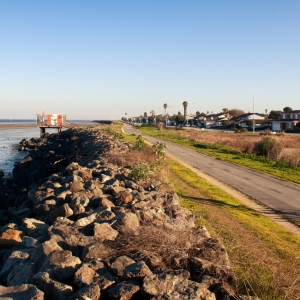The Stream, March 12, 2020: Polar Ice Shrinking Six Times Faster Than in the 1990s, Data Shows
The Global Rundown
Polar ice caps are diminishing six times faster than in the 1990s, data shows. A new report warns that climate change and global urbanization could drive an increase in dissolved organic carbon in groundwater, jeopardizing drinking water sources. A $2 million deal rerouting a Lake Michigan water line could resolve a water dispute between two Wisconsin cities. The U.S. government pressures cities to evict homeowners from flood-prone areas. A new study highlights the importance of mangroves in flood protection worldwide.
“Every centimetre of sea level rise leads to coastal flooding and coastal erosion, disrupting people’s lives around the planet.” –Andrew Shepherd, at professor at the University of Leeds, in reference to rapidly accelerating ice melt in Greenland and Antarctica. A recent analysis shows that polar ice caps are melting six times faster than in the 1990s, paralleling the worst-case scenario climate warming models projected by the Intergovernmental Panel on Climate Change (IPCC). If sea level rise continues unchecked, it could jeopardize more than 400 million coastal residents worldwide by 2100. The Guardian
Latest WaterNews from Circle of Blue
Building Bigger Walls in San Francisco Bay to Hold Back Rising Waters — Rising seas and a better understanding of flood risks prompt shoreline communities to build higher levees.
HotSpots H2O: Public to Decide Fate of Contested Brewery in Northern Mexico — Last month was the wettest February ever recorded in the United Kingdom, and more rain is expected over the next week, warns the country’s Met Office.
By The Numbers
$2 million Size of a deal that will reroute a Lake Michigan water line and allow a pumping station and reservoir tank to be built in Waukesha, Wisconsin. Waukesha has been seeking a new water source after radium in its current aquifer exceeded federal standards. The quest has brought Waukesha into contention with the neighboring city of New Berlin after a permit for a similar facility within New Berlin’s border was denied. The new agreement could help resolve a lawsuit between the two cities. Milwaukee Journal Sentinel
$65 billion Estimated amount of flood damages that mangrove trees prevent each year, according to a new study that was published in Scientific American by the University of California, Santa Cruz. The study highlights the importance of mangroves worldwide, and states that up to 15 million more people in hotspots would experience flooding each year without mangroves forests. Science Daily
Science, Studies, and Reports
A study by the University of New South Wales warns that climate change and urbanization could lead to heightened levels of dissolved organic compounds (DOC) in groundwater. DOC is naturally-occurring, but can bind with heavy metals, compromising groundwater supply. The researchers predict that both warmer temperatures and increased urbanization are likely to boost levels of DOC across the globe. UNSW Sydney
On the Radar
The U.S. government is instructing coastal cities to evict people from flood-prone homes using eminent domain, or else lose a chance at funding that could help protect the cities against climate change. The decision placed upon cities is part of an initiative by the Army Corps of Engineers to minimize the number of people living in flood zones, but the use of eminent domain as a response is a highly controversial approach that has some cities resisting while others are cooperating with the Corps. The New York Times
Kayla Ritter is a recent graduate of Michigan State University, where she studied International Relations and Teaching English to Speakers of Other Languages. She is currently based in Manton, Michigan. Kayla enjoys running, writing, and traveling. Contact Kayla Ritter






Leave a Reply
Want to join the discussion?Feel free to contribute!